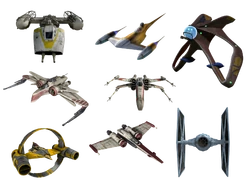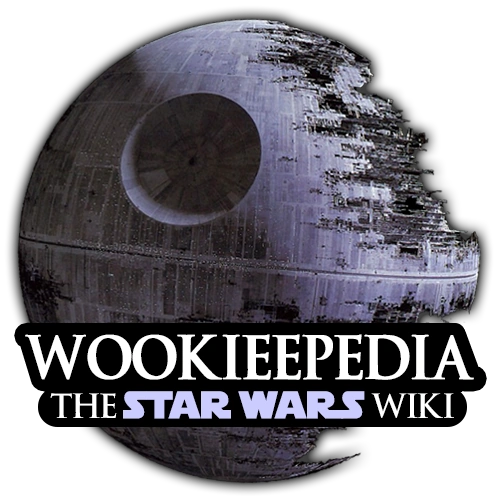| | |

Various starfighters
A starfighter, or simply called fighter, was a small and maneuverable spacecraft designed for combat in the atmosphere or space. Certain models of bombers, gunships, transports, light freighters, shuttles, trainers, and atmospheric fighters could be considered starfighters as well, and often fulfilled many of the same functions.
Classifications
Starfighters often had some degree of overlap with other ship classes, as well as a few distinct sub-classes. Bombers were starships designed to carry heavy ordnance payloads, often at the expense of maneuverability and straight-line speed. Interceptors represented a range of starfighters that usually emphasized speed and agility over versatility and firepower, sometimes at the expense of ordnance payloads, life support, or hyperdrive capabilities. Gunships were heavily-armed vehicles designed to deploy ground forces in landing zones created by their heavy weaponry. Their heavy armament often granted them considerable air-to-air or space-to-space combat capabilities, despite being optimized for air-to-ground combat.[1][2] Certain classes of starfighters could be modified to trainers while still retaining combat capability.[3] Certain classes of transports, shuttles,[2][4] and light freighters,[2][5] although more commonly used to move cargo and passengers around, could also pack considerable armament and maintain a degree of maneuverability. The common trait possessed by all of these classes is their heavy armament in relation to their small size.
History
Early years
Starfighters had been an integral part of space-based combat for millennia, seeing action as early as the days of the Old Republic.[6] However, with the formation of the Galactic Republic and the millennium of relative peace that followed, large-scale battles between opposing space-based combatants were completely unheard of.
Invasion of Naboo
In 32 BBY, the Jedi Order operated the Delta-7 Aethersprite-class light interceptor, but primarily used them for personal transport instead of space combat.[7]
That year, N-1 starfighters of the Naboo Royal Space Fighter Corps engaged and defeated the Trade Federation's Vulture-class starfighters during the latter's invasion of Naboo.[8] This brief and localized conflict set the stage for the Separatist Crisis. In the final days of the crisis, N-1s served as escorts for Senator Padmé Amidala's personal transports.[9] Some N-1s were combat-capable during the Galactic Civil War.[10] The Vulture droids also had a long lifespan, with some remaining operational in the Age of the Empire.[11]
Clone War
During the Clone War, the Jedi continued utilizing the old Delta-7s,[9] but also developed the Delta-7B Aethersprite-class light interceptor[12] and Eta-2 Actis-class light interceptor.[13] The clone trooper pilots under their command flew Low Altitude Assault Transport/infantry gunships,[9] V-19 Torrent starfighters,[12] BTL-A4 Y-wing assault starfighter/bombers,[14] Aggressive ReConnaissance-170 starfighters,[13] Clone Z-95 starfighters,[15] and Alpha-3 Nimbus-class V-wing starfighters.[13] Grand Master Yoda operated his own customized Actis-class fighter.[16] Skull Squadron, a Mandalorian unit serving the Republic, flew Fang fighters.[17] At the conclusion of the Clone War, some of the Republic starfighter classes would be inherited by the Galactic Empire, while others would be decommissioned and fall into the hands of the rebellion. Others would be discarded entirely, seeing almost no military service after the conclusion of the war.
The Separatists, which opposed the Republic in the Clone War, mainly used Vulture-class droid starfighters built for the Trade Federation.[12] Later, to counter increasingly capable and diverse clone fighters, the Confederacy manufactured and deployed droid tri-fighters,[13] Hyena-class bombers,[18] and HMP droid gunships.[13] The Separatists also built manned fighters for their organic commanders, such as Rogue-class starfighters,[12] Belbullab-22 starfighters,[13] and Ginivex-class fanblade starfighter.[19] Geonosian forces, which allied themselves with the Confederacy, flew Nantex-class territorial defense starfighters,[9] while the Umbaran Militia flew their indigenous Umbaran starfighters.[15] The Zygerrian Slave Empire, which allied itself with the Confederacy, had a small force of Huttese HH-87 Starhoppers, which saw action against Republic forces on Kadavo.[20] Death Watch, a Mandalorian splinter group allied to the Confederacy, operated Kom'rk-class fighters, which doubled as transports and bombers.[21] After falling out of Count Dooku's favor, Death Watch would pledge their loyalty to Darth Maul's Shadow Collective, but would continue to use the ships in battle.[22] After the conclusion of the war, many of the starfighters used by the Confederacy's regular forces survived the Clone War and were used by rebels fighting against the Empire.[23][11]
Age of the Empire and Rebellion
At the conclusion of the Clone War, the Imperial Military inherited some of the starfighter classes of the Republic Navy. By the time of the Galactic Civil War, however, it was reliant on the TIE line. This new generation of vehicles, powered by twin ion engines, were developed from technology used in the older Republic starfighter and transport classes. These craft included the famous TIE/ln space superiority starfighter,[24] TIE Advanced v1,[25] TIE/sa bomber,[26] TIE Advanced x1,[24] TIE/IN interceptor,[27] TIE/D Defender,[28] TIE/sk x1 experimental air superiority fighter, and TIE Reaper[4]. The Empire also deployed VT-49 Decimators on occasion as bombers[2]. In addition to Imperial use, numerous TIE/LNs were given to the Mining Guild and converted to Mining Guild TIE fighters.[29] Imperial TIEs would occasionally fall into rebel hands, and the rebellion made good use of these opportunities.[30][31]
Out of sheer desperation for any equipment they could obtain, the rebellion operated numerous starfighter classes from a variety of sources. Bail Organa's rebel network operated RZ-1 A-wing interceptors as early as 18 BBY.[32] The Free Ryloth movement used old Separatist droid starfighters in 14 BBY.[11] Berch Teller's rebel cell also used Separatist fighters, in addition to Z-95 Headhunters.[23] Beginning around 5 BBY,the Spectres made use of the Phantom, a customized Corellian VCX-series auxiliary starfighter that doubled as a shuttle and scout craft. The Spectres eventually joined Phoenix Squadron, which utilized A-wings and a small number of RZ-1Ts, which were A-wings converted into two-seat trainers. Jan Dodonna's unit made use of decomissioned Republic Y-wings, which served as multi-role fighter-bombers. Later, the loose-knit network of rebel cells morphed into the better-organized Alliance to Restore the Republic, which continued to operate a fairly rag-tag collection of whatever equipment they could acquire.[33] The Rebel Alliance Starfighter Corps made use of A/SF-01 B-wing starfighters,[27] E-50 Landseers, converted HWK-290 light freighters,[2] T-65B X-wing starfighters,[24] T-65C-A2 X-wing starfighters,[34] UT-60D U-wing starfighter/support craft,[4] and at least one YT-1300 light freighter,[24] in addition to some of the older classes.[2][10] Additionally, the rebellion made use of stolen TIE fighters in desperate situations.[30][31] Many starfighter types used by the various rebel groups continued to see action with the New Republic.[35]
Post-Endor
In its early days, the New Republic continued to operate the rebellion's old starfighter classes, and even continued stealing TIEs when the need arose.[35] Beginning in 5 ABY, the New Republic operated the T-70 X-wing fighter,[36] which was an upgraded version of the T-65. By the time of the First Order–Resistance conflict, the New Republic Starfleet had retired all of the older starfighter classes (as well as some of the newer ones, such as the B-wing Mark II) in favor of the T-85 X-wing.[37] The Resistance's Starfighter Corps continued using T-70s donated by sympathetic senators.[38] They also made use of a small number of single-seat A-wings[39] and a few Z-95 Headhunters[37] for covert opertions, both types having long since been retired from New Republic service.
The First Order Navy continued the TIE line that the Empire had begun, with the new models upgraded to modern combat standards. This new generation of TIEs included the TIE/fo space superiority fighter, the two-seat TIE/sf space superiority fighter used by the Special Forces,[38] and the TIE/vn space superiority fighter used by Kylo Ren.[40]
Appearances
Non-canon appearances
Sources
Notes and references
- ↑
 Droid gunship in the Encyclopedia (content now obsolete; backup link)
Droid gunship in the Encyclopedia (content now obsolete; backup link)
- ↑ 2.0 2.1 2.2 2.3 2.4 2.5 Star Wars: Commander All starships that could be deployed from the Starship Command were identified as starfighters in-game. Among these were the Low Altitude Assault Transport/infantry, HWk-290 light freighter, and E-50 Landseer shuttle.
- ↑
 Star Wars Rebels — "Visions and Voices"
Star Wars Rebels — "Visions and Voices"
- ↑ 4.0 4.1 4.2 Rogue One: A Star Wars Story. LMTR-20 was identified as a "shuttle" during the film, and was designated as a UT-60D U-wing starfighter/support craft. Cite error: Invalid
<ref>tag; name "RO" defined multiple times with different content - ↑ Star Wars: Episode VI Return of the Jedi During the Battle of Endor briefing scene, Gial Ackbar stated that the fighters would fly into the Death Star II to destroy the reactor core. Since the Millennium Falcon flew into the Death Star, it is indirectly identified as a starfighter.
- ↑
 Star Wars: The Clone Wars — "Citadel Rescue"
Star Wars: The Clone Wars — "Citadel Rescue"
- ↑ Star Wars 26: Yoda's Secret War, Part I
- ↑ Star Wars: Episode I The Phantom Menace
- ↑ 9.0 9.1 9.2 9.3 Star Wars: Episode II Attack of the Clones
- ↑ 10.0 10.1 Shattered Empire, Part III
- ↑ 11.0 11.1 11.2 Lords of the Sith
- ↑ 12.0 12.1 12.2 12.3 Star Wars: The Clone Wars (film)
- ↑ 13.0 13.1 13.2 13.3 13.4 13.5 Star Wars: Episode III Revenge of the Sith
- ↑
 Star Wars: The Clone Wars — "Shadow of Malevolence"
Star Wars: The Clone Wars — "Shadow of Malevolence"
- ↑ 15.0 15.1
 Star Wars: The Clone Wars — "Darkness on Umbara"
Star Wars: The Clone Wars — "Darkness on Umbara"
- ↑
 Star Wars: The Clone Wars — "Voices"
Star Wars: The Clone Wars — "Voices"
- ↑ Kanan 10: First Blood, Part IV: The Mesas of Mygeeto
- ↑
 Star Wars: The Clone Wars — "Cat and Mouse"
Star Wars: The Clone Wars — "Cat and Mouse"
- ↑
 Star Wars: The Clone Wars — "Nightsisters"
Star Wars: The Clone Wars — "Nightsisters"
- ↑
 Star Wars: The Clone Wars — "Escape from Kadavo"
Star Wars: The Clone Wars — "Escape from Kadavo"
- ↑
 Star Wars: The Clone Wars — "The Mandalore Plot"
Star Wars: The Clone Wars — "The Mandalore Plot"
- ↑ Star Wars: Darth Maul—Son of Dathomir
- ↑ 23.0 23.1 Tarkin (novel)
- ↑ 24.0 24.1 24.2 24.3 Star Wars: Episode IV A New Hope
- ↑
 Star Wars Rebels — "Empire Day"
Star Wars Rebels — "Empire Day"
- ↑ Star Wars: Episode V The Empire Strikes Back
- ↑ 27.0 27.1 Star Wars: Episode VI Return of the Jedi
- ↑
 Star Wars Rebels — "Secret Cargo"
Star Wars Rebels — "Secret Cargo"
- ↑ Star Wars Rebels: Steps Into Shadow
- ↑ 30.0 30.1
 Star Wars Rebels — "Fighter Flight"
Star Wars Rebels — "Fighter Flight"
- ↑ 31.0 31.1
 Star Wars Rebels — "Fire Across the Galaxy"
Star Wars Rebels — "Fire Across the Galaxy"
- ↑ Ahsoka (novel)
- ↑ Star Wars Rebels
- ↑ Star Wars: Rogue One: The Ultimate Visual Guide
- ↑ 35.0 35.1 Aftermath
- ↑ Aftermath: Empire's End
- ↑ 37.0 37.1 Before the Awakening
- ↑ 38.0 38.1 Star Wars: Episode VII The Force Awakens
- ↑ Star Wars: Poe Dameron
- ↑
 Kylo Ren's New Ship, The Last Jedi Cast at D23, & Star Wars: Galaxy's Edge! on StarWars.com (backup link)
Kylo Ren's New Ship, The Last Jedi Cast at D23, & Star Wars: Galaxy's Edge! on StarWars.com (backup link)
